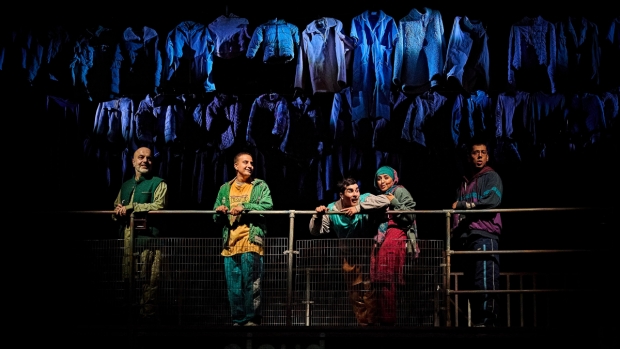”The Boy With Two Hearts” at the National Theatre – review

© Jorge Lizalde / studiocano
The horrors that we have witnessed on our TV screens of events in Afghanistan appear to be never ending. The withdrawal of America last year allowed the Taliban to retake control of the region with frightening speed and a terrifyingly familiar brutality. The colossal inaction of the West has caused so much pain and suffering and has paved the way for the suppression of women to truly ghastly proportions – taking the country backwards once more.
Hamed and Hessam Amiri’s astonishing, real-life story of bravery and family strength starts in Herat in 2000 – pre 9/11 and before the subsequent American invasion. Their mother, Fariba, publicly speaks out against the Taliban, calling them thugs and decrying their treatment of women. It’s a passionately delivered and rallying cry from Houda Echouafni’s Fariba. It’s not long, however, before the thugs are at the door and force the Amiri family to run – Dad Mohammed (a robust Dana Haqjoo) leads his wife and three sons on an unfathomably difficult journey in search of a better life – also desperate for medical treatment for his eldest son’s heart condition.
The 14-year old Hussein (Ahmad Sakhi) has regular attacks, which later are confirmed to be caused by Ventricular Tachycardia. His younger brothers Hamed and Hessam (Farshid Rokey and Shamail Ali) have an unbreakably strong bond with one another as they look out for their brother. The subsequent book that they wrote to honour Hussein’s memory is the material on which this play – first produced last year in Cardiff – is based. It is essentially a love story to their kind, but ultimately broken-hearted brother.
Amit Sharma’s production works hard to adequately portray the horrors of the journey that the family of five make across Russia, into Ukraine, Vienna and France before finally arriving in the UK. It is this final destination that the Amiris see as their salvation and where Hussein’s heart will undoubtedly be fixed. Whilst Hayley Grindle’s functional designs might lack interest overall, they do have some striking moments to portray key parts of the journey. A hidden space in a high gantry opens up to reveal the family crushed in together in the boot of a car, and a particularly claustrophobic moment sees the travellers being increasingly deprived of oxygen in the back of a lorry.
Continuous captioning of the entire piece is sometimes useful – particularly when translating the moments spoken in Farsi, though the additional projection work is unnecessary. Elaha Soroor provides a haunting vocal soundscape as she moves around proceedings with an ever watchful eye as both singer and co-composer (with Tic Ashfield).
Phil Porter’s adaptation of Hamed and Hessam’s book is sadly littered with clunky dialogue – so full of exposition that it blights the drama and the emotional core of the play. The horrors experienced and the fears that the family are continually facing are never given full force, so the impact doesn’t fully land.
This desperate family travelled for 18 months to escape the terrible trappings of their home country – they endured unimaginable experiences as they fled for their lives – yet at the end of it all they are grateful to have each other. They are grateful for Hussein’s life. They are grateful to all those people that helped.
These two young men strike a gracious and positive note and wear their hearts on their sleeves, at a time when the world is in turmoil and so many people are being displaced. It is a powerful message indeed.










